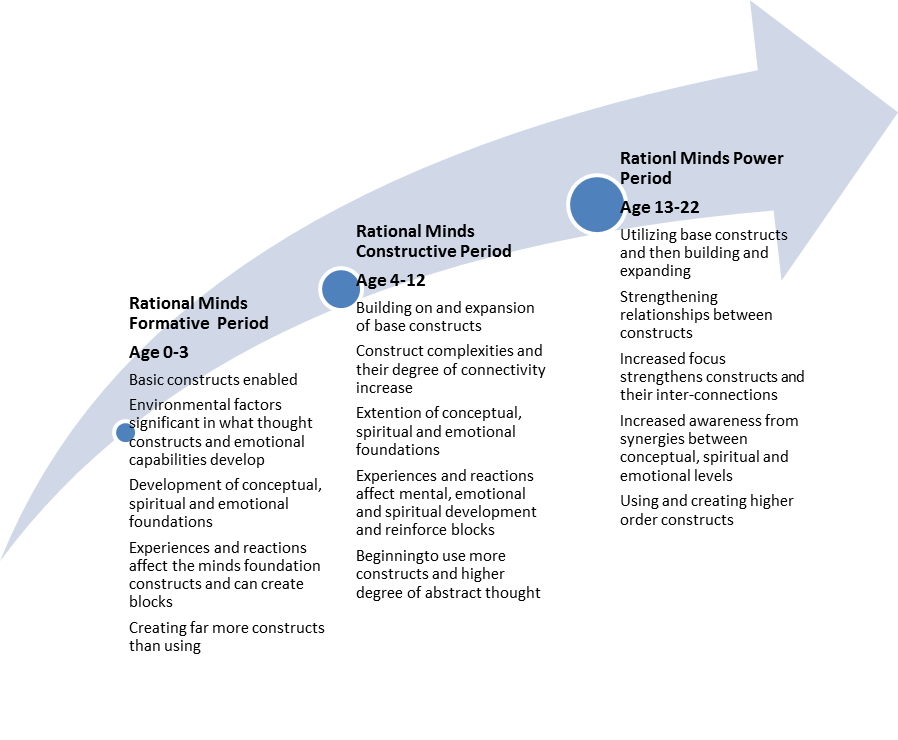 Introduction to the Rational Mind (RM)
Introduction to the Rational Mind (RM)
The meaning of the term rational mind differs depending on who is discussing it, and the context. I use the term in reference to the part of us that “thinks”, has thoughts and uses words or language. It is intrinsically linked to our body through our brain and is the mind of our "waking consciousness", the one that contains our thoughts, and is often the one that keeps us up at night by its ramblings. It includes the non-conscious mind, what people call their subconscious mind, which is always there influencing our thoughts and actions in the background. It is this portion that is the most difficult to work with as it remains hidden within our awareness. Despite its influence on all aspects of our life, few grasp how significantly it influences our perception (thoughts, thinking processes) and hence the choices we make. It is also where the roots of all our issues reside.
We are not born with a functional rational mind. It begins to take form after birth when we begin to interact with the world around us and integrates our experiences. It develops significantly in the first couple of years just to get us to the point where we start learning to communicate with others. Its foundation continues take form during the next few years as we begin to develop various concepts and skills.
The child learns to react to various influences to develop what you could refer to as their program of rules and responses. During the first few years of our lives these reactions form the basis of our rational mind, the program itself. Given certain stimuli, the child responds in a particular way based on its experiences. Each and every experiences adds to the developing body of knowledge and the child's possibilities for expression. This is not full full knowledge since we do not experience every possible option and only do so from our subjective personal perspective. Experiences lead to greater complexity within the mind and as we shall see, a growing degree of uncertainty.
When we are young we have had fewer experiences hence the rational mind develops with assumed truths many of which are misconceptions. Misconceptions do not necessarily stay with us as new information affects existing thoughts and will change or eliminate some misconceptions that are no longer valid. Our physical functions typically use only verifiable truths; after all, we cannot function if we cannot get our bodies to do what we need them to. For example, we do not have misconceptions about how far the ground is when we step forward or where our feet are relative to it. Typically, misconceptions arise where the thoughts are about other thoughts rather than being about "things". We create them when we integrate experiences and, for example, assign causality where none exists, rely on erroneous or incomplete reasoning or superficial observation. Stereotyping is a prime example of our misconceptions in action.
Our rational mind categorizes all aspects of each experience by associating them with other experiences we have had or thoughts we have created. Unrelated information is not connected, unless we force a connection; however, loosely connected information can be and is. Where this happens, our rational mind uses its imagination to create virtual thoughts or constructs to interpret the experience. This connects existing thoughts in new ways.
We create a vast library of virtual constructs and they blend in just like any other aspect of our rational mind. We are complex creatures and our rational mind contains a virtually uncountable number of these highly connected constructs. The misconceptions and contradictions among them lead to the issues we face. A large number of our issues arise from basing new virtual thoughts on misconceptions. We want to notice or recognize these misconceptions; fortunately, we can learn how to do so.
Noticing the consequences of our misconceptions is fairly easy; however, knowing which misconceptions led to various outcomes is another matter. This is, in part, due to the almost infinitely complex relationships that thoughts form among themselves. As a result, noticing the patterns of experiences in our lives can be even more difficult than finding and changing the thoughts themselves. We take on poor notions and develop many of our misconceptions as children in no small part due to our lack of a developed reasoning process and other mental skills.
During the teenage years, the physical changes in the body take precedence, driving the development of the child against the backdrop of previous experiences and their reactions to them. Many of the problems teens encounter are a consequence of their early mental development or programming. For instance, a child who is accustomed to getting his or her way, who is undisciplined, or who is catered to during their first nine years of life has a higher likelihood of having difficulty with control issues during their teenage years.
We tend to bury these issues or inconsistencies in our non-conscious mind rather than discard them as we grow older. Burying them does not remove their influence, especially in the case where we have had strong or repeated emotional reactions to experiences. We are likely to expression these emotions in some fashion or another because the thoughts that give rise to strong negative emotions are unbalanced and reinforce active thought forms they share a commonality with. This has two consequences. One thing it does is shift our thoughts towards the lower mental levels which in turn manifests lower emotional energies. When our awareness is focused on lower level thoughts we have limited our use of higher reasoning. Strong, positive thoughts and the comparable emotions have the opposite effect.
As I have stated, our experiences and reactions to them form our foundation or base program. How the mind does this is common to all, what we develop is unique to us. When the program has problems, we have problems and issues in life. We may not notice them but they are there. Often we avoid things that cause us discomfort, without even knowing the its source, by moving around the issue rather than addressing it. At best, the result is only to delay the inevitable. We manifested the issue because of an imbalance within us, its source is not external. If the imbalance is significant for our growth we will continue to manifest related issues until we resolve the imbalance. The importance of a particular lesson often result in escalation of the issue and can result in drawing in other thoughts.
We are often not aware of the root issues for a particular problem. One issue can manifest any number of ways, remain hidden from our conscious awareness or be masked by other issues. There are a number of reasons for this. First of all, we are not here to work on just one specific issue or development point and second, we have collected so much junk over the years that issues become entwined. As a result we have many areas where we need to grow. By paying attention to what is going on in our life and seeing ourselves as the author of our experiences we are better able to see what we need to work on.
Every event in our life contributes to the programming of our rational minds. We learn by experience, through our interactions with everything around us. We continue to modify the program that is our rational mind with every experience we have. In a very real way, our responses are somewhat robotic. We often react without even realizing what is going on and that we attract certain experiences as a result. We train our minds to avoid things that cause us pain in one way or another, but this does not mean that we are avoiding bad situations. We are the source of our own pain and it remains whether we are aware of it or not. Further, with so much cross threading of thoughts and emotions, we may be making matters worse.
Part of our problem is that our memories and interpretations of events are not always accurate, and these misinterpretations carry only one point of view, that of our poorly programmed rational mind. Given that our rational mind interprets what it perceives based on how its programming, there appears to be somewhat of a dilemma in even learning what the truth is. This is an all too real challenge. There is the event and there are reactions to it, both are highly subjective. In terms of our awareness, the essential truth to remember is that the truth is not essential. The fact is we don't know ourselves anywhere nearly as well as we tend to think.
The rational mind is the part of us that performs certain types of functions that are quite essential; unfortunately, we were too young to understand how it works when we built it. The fortunate reality is that our rational mind is definitely not us and we can learn to reprogram it.
Rational Mind Development: The Early Stages


© 2009 Allan Beveridge
Last edited June 8, 2016
